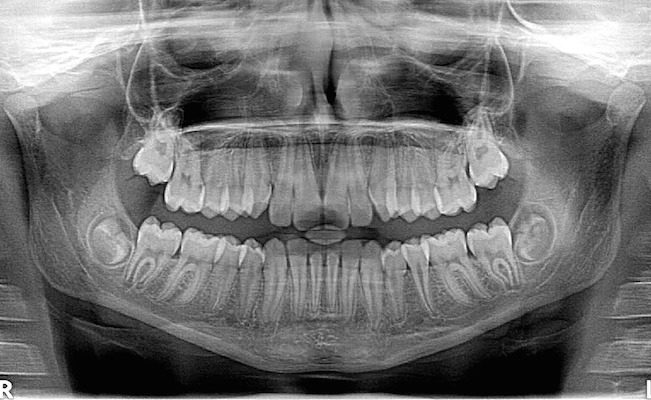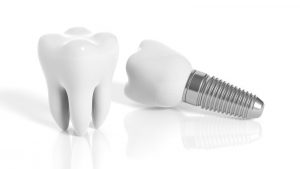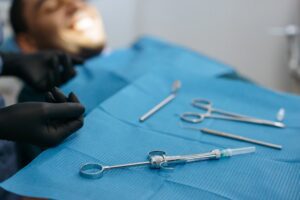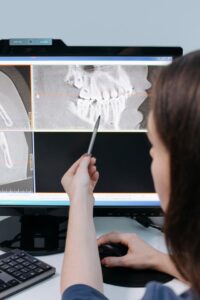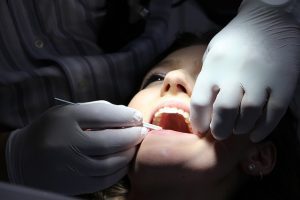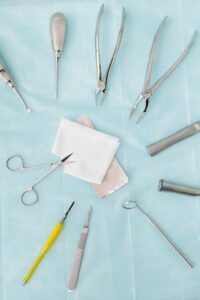Most dentist suggest you have dental x-rays taken yearly. And there’s never a big to-do about it; it only takes moments to get a full 360-degree set of images of your entire mouth and jaw. X-rays can be invaluable, as they can catch big issues early – before they’re even issues at all.
Wait – but aren’t x-rays full of radiation? They literally make you wear a lead vest if you’re getting your leg x-rayed in the hospital; why can you have one of those thing 6 inches from your face and be okay? Is it safe?
Yes; they’re totally safe. Dental x-rays are one of the lowest radiation studies you can have done. A routine exam, with four bitewings, causes the body to absorb about 0.005 mSv (millisievert) of radiation, which is less than one day of natural background radiation in the environment. This is also about the same amount of radiation you would receive from a one-to-two-hour airplane flight. A panoramic x-ray provides more radiation, but only about 0.007 mSv.
One millisievert is the average accumulated background radiation dose to an individual for one year, exclusive of radon, in the United States. So we’re talking .5 to .7% of all the radiation you naturally accumulate every year. See? So not a big deal.
When do you need oral x-rays?
Dental x-rays help your dentist see damage and disease not obvious to the naked eye. This is the first place your doctor can tell whether your wisdom teeth will come in okay or need to be extracted, or how well your jaw has healed after a facial trauma. You need x-rays for anything below the gums. You jawbone literally holds your face together; it’s kind of important.
How often you need an oral x-ray done depends on the quality of your dental health, your disease risk, and how old you are. Children need x-rays more often because their teeth and jaws continue to grow, and their teeth are more prone to tooth decay.
Your dentist will conduct an overview of your medical and dental history, inspect your teeth and gums, and then determine if x-rays are necessary.
Dental x-rays for new patients
If you are a new patient, we may do x-rays to get a better understanding of your dental health. This gives us a more complete picture of any care you might require in the future. We’ll look for signs of tooth decay, examine the health of your gums, and examine the quality of your tooth development.
If your previous dentist has x-rays of your mouth, you may forward x-ray copies to your new dentist.
While the dentist or oral surgeon may put a lead apron or thyroid collar on you, this is only out of an abundance of precaution. The radiation from dental x-rays has not been linked to increased risk of cancer.
Today’s x-rays emit less radiation than in the past
Dental patients are exposed to lower levels of radiation today than in the past. Digital technologies, more precise radiation beams, and shields placed over patients’ chests and thyroids make getting an x-ray safer today than ever before.
Even for pregnant women, dental x-rays are safe. If you are pregnant or breast feeding, dental x-rays do not need to be postponed.
To protect children, The American Dental Association has joined with more than 80 other health care organizations to promote Image Gently, an initiative to “child size” x-rays of children in medicine and dentistry.
Providers are urged to:
- select X-rays for individual needs, not as a routine;
- use the fastest image receptor available;
- use cone-beam CT (CBCT) only when necessary;
- collimate the beam to the area of interest;
- “child-size” the exposure time
For children and women of childbearing age or who are pregnant, we recommend a leaded thyroid collar.
Risks & Benefits of Dental X-Rays
Some studies have shown a link between dental x-rays and thyroid cancer and certain forms of brain cancer, but these studies have been questioned, because they rely on patients’ recollection of how many x-rays they’ve had, not actual data. People tend to guess more x-rays than they have actually had.
When considering a dental x-ray, weigh the potential benefits of early and accurate diagnosis of disease against the very minimal risks of cancer from an accumulation of radiation. The risk of long-term complications from an untreated dental disease is much higher that the risk of cancer from an x-ray.
Dental x-rays are safe, quick and affordable. The cost is nothing compared to the cost of lost teeth, dental disease or jaw bone deterioration. Yearly x-rays will help your dentist track your oral health in a comprehensive way, and if worries do arise or accidents happen, an extra x-ray or two won’t hurt a bit.
